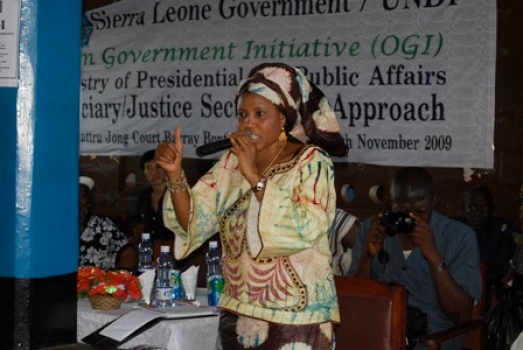
By KABS KANU and PASCO TEMPLE (Government International Media Unit ) :
The Open Government Initiative ( OGI ) , a brainchild of President Ernest Bai Koroma , was set up in 2008 as an independent organ and an essential part of President Koroma’s Agenda of Change, with the expressed purpose to promote accountability and transparency in governance in Sierra Leone . The OGI sseks to bring the government to the people and to involve the citizenry in democratic and participatory decision-making . The Initiative is designed to be a vehicle to end the age-old problem of alienating the people of Sierra Leone from participatory decision-making in governance in a brilliant move to cure one of the reasons that led to the 11 year civil war , as discovered by the Truth and Reconciliation Commission ( TRC ), which probed the reasons for the war.
According to the United Nations Development Project ( UNDP), one of the stakeholders of the OGI, “The main objective of OGI is to promote platforms through which the Government and the population directly interact, thereby enhancing transparency in the process of the business of governance.” The UNDP also states that “The OGI aims to bring elected and appointed officials to account to the population for actions taken on their behalf and to enable the Government feel the pulse of the people and better understand their development needs and priorities.”
MADAM KHADIJA SESAY
Furthermore , ” The project also provides the government with an opportunity to receive feedback on its performances and areas for alignment. Overall, OGI seeks to support a more people-centered governance leading to a deepening of democracy and trust in the governance authorities through a more active, engaging and widespread national conversation. …Through OGI the Presidency, relevant Ministers, Members of Parliament and the Judiciary visited the districts to have face to face discussions with the people about their day to day challenges, such as agriculture, stable energy supply, promotion of girl’s education, employment of youth, improvement of health, education, prison and police facilities. People asked questions and expected answers and the voices of people in turn informed policy development….Available information communication technologies, such as UN radio, community radio networks, mobile text messaging are used to engage the people nation-wide in this policy dialogue. ”
In keeping with its lofty mandate, the OGI travelled all over Sierra Leone recently to conduct a Survey on the Ebola scourge in Sierra Leone. The survey targeted four areas :
- How far the house-to-house sensitization had gone , how effective it was and how successful it had been, if at all .
- How much Ebola has affected the country , and what was going on along the borders and the exit and entrance points of the country.
- How effective the Government’s management and containment system of the Ebola disease and the distribution of goods and services . This was accompanied by suggestion boxes in all the epicentres and holding and treatment centres in an attempt to engage citizens and to get their feedbacks and suggestions on the efforts to contain the disease in Sierra Leone.
- How effective the response mechanism to Ebola. The public was sensitized about the use of the 644 governance number , which operates separately from the Ebola reporting hotline and health care number , 117. The 644 number is a monitoring mechanism of the Ebola situation for transparency purposes.
The Director of the OGI, Madam Khadija Sesay , is in the U.S. to expand the OGI ‘s sphere of influence and operations in the diaspora since the OGI is now a member of the global Open Government Partnership ( OGP ) , which according to information in its website , “was launched in 2011 to provide an international platform for domestic reformers committed to making their governments more open, accountable, and responsive to citizens.” Sierra Leone is now one of the 65 participatory countries in the OGP and since her arrival in the U.S, Madam Khadija Sesay has been engaging the U.S. State Department, the White House and the World Bank to help develop ambitious reforms about acountable and transparent governance in Sierra Leone.
Last Saturday, Madam Khadija Sesay conducted an exclusive interview with Kabs Kanu and Pasco Temple of the Sierra Leone Government International Media Unit in the U.S. during which she released the results of the Citizens’Survey , which has spelt out why Sierra Leone is still struggling to contain and defeat the Ebola Scourge which has killed hundreds of people, infected thousands more and sent the economy into a tail-spin.
According to Madam Sesay, the Survey discovered that Ebola hs not been contained because :
- During the government’s respomse to the outbreak, President Koroma presented a list of desperately needed resources which, he said would enable Sierra Leone to cut the disease and contain it in 90 days . The International community’s failure to address this list has hampered the Ebola fight. According to Khadija Sesay, the survey revealed that that if 2/3 of these resources had been provided by now, Sierra Leone would have been able to contain Ebola in the stipulated 90 days period . According to the Survey, the probability of containing the disease would have been greater if the list presented by President Koroma had been addressed.
- The survey also found that the International Community are concentrating the scant resources they have given in the hands of affiliate organizations on the ground who are not giving account or coordinating with the government . According to the survey, partners have organizations on the ground which do not understand the genesis and the behavioral patterns of the people , one of the big setbacks in the Ebola fight Since behavioral patterns are largely responsible for the spread of the disease , coordination between the organizations and government is necessary to help change these behavioral patterns and traditions. Coordination is also needed in the distribution of goods and services. According to Ms. Khadija Sesay , the survey revealed one big problem : The bypassing of the President in the utilization and distribution of the resources . According to her, President Koroma was not only born and bred in Sierra Leone; he has spent all his life in the country and has never lived abroad and understands the 16 ethnic groups and their behavioral patterns to his finger -tips .He could have done a far better job instructing and guiding these affiliate organizations about how to approach the people with regards to changing their behaviors and in the distribution of goods and services ( as against the minimum benefits accrued when these affiliate organizations go it all alone ) . “What am I saying ? ” Khadija Sesay asked rhetorically and went down to earth in her answer . “I am saying that President Koroma should not have been bypassed. I am frustrated over the analytics because they vindicate President Ernest Koroma from all the blames that have been heaped on him because his earlier requests for coordination and the list of needed resources were not provided . “
- The survey found that international partners should go back and address the President’s list.
- According to Madam Sesay, the survey also found that all monies provided NERC for Ebola are not dispensed without 4 signatories –one each from NERC, State House, WHO or UNICEF and the Chief Medical Officer ( CMO ) . If there is any questions around any money set for the Ebola fight , the international partners do not sign the checks . There has to be due diligence before they sign. She lauded this move because it impacts on the principles of accountability and transparency. Her concern however is that Sierra Leoneans at home and abroad are not being made aware of this fact and this is a failure of transparency, she stressed . The perception out there is that all monies are being received and distributed by President Ernest Koroma and Government, which is far from the case . Khadija Sesay cited a typical example of this problem of misapplication of responsibility in the ebola fight, which is not promotive of transparency and accountability. The World Food Project ( WFP ) is thrust with the mandate to feed quarantined people. That task was specifically assigned them. If quarantined people are hungry, the blame should be laid at the doors of the WFP, not the Sierra Leone Government . However, people cast blame on the government whenever there is a problem with the feeding of quarantined people , not taking into consideration that there is an international organization specially mandated to perform the task.
Khadija Sesay expressed grave concern that Sierra Leoneans in the diaspora were faced with two daunting problems. Firstly, they have lots of concerns, fears and anxieties about what is going on in their country , which are not being addressed in the atmosphere of accountability and transparency . Secondly, they are buffeted by negative perceptions, which again could be attributed to lack of transparency.
Khadija Sesay said that the OGI would seek to address this problem through an open data system to monitor the actions of the International community. . This open data will provide reliable information to diasporans and other international partners about what is going on in the ground. The open data system will also target local partners and financial contributors as it will provide information about how funds are coming in and being disbursed.
She also said that the OGI will be addressing the dynamics of the hysteria and anxieties in the diaspora in another way . “We are going to involve all the information attaches who will be joining us on the ground for two weeks’ training .The OGI will partner with the Ministry of Information and Communication and the World Bank to conduct a symposium /town meeting involving international partners , civil society, the NGOs and the media to address the issues on the ground with a view to reporting the correct information to the outside world for accountability and transparency purposes . This will enhance transparency between the government and the diaspora . After all this, there will be a new dawn in the fight against Ebola , which we will fight as a team “, she stressed .
Madam Sesay promised that the OGI , as mandated by the government, will continue to create a well-informed citizenry in the socio-economic and political development of the country as a way of promoting good governance in Sierra Leone .
GOVERNMENT INTERNATIONAL MEDIA UNIT, USA

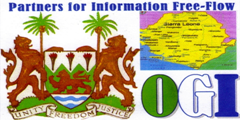
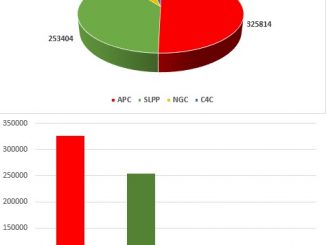
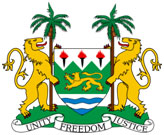
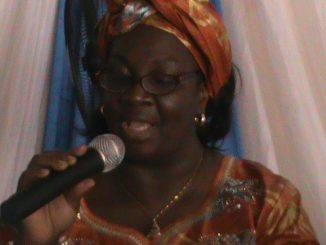
Leave a Reply